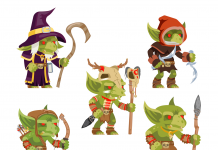Assignment Content
Mobile gaming is one of the hottest industries on the planet, worth more than $50 billion. That’s nearly half of all gaming revenue and more than 80 percent of the app revenue from iTunes and Google Play. However, for every Candy Crush Saga or Angry Birds, there are millions of mobile games sitting unused and unloved. Making your mobile game applications more engaging is the best way to create loyal fans and boost your mobile gaming revenue.
Host Contests

Image via Flickr by m01229
Hosting contests within your gaming application is an ideal way to boost engagement. For example, you might announce a tournament and award free lives, bonus credit, or even real cash or other physical prizes to the winners. Users will tend to play longer as they try to climb your leaderboard, beat their friends and other players, and earn incentives.
Candy Crush Saga is one gaming app that regularly hosts contests including Star Chaser, Fishing Tournament, and Striped Candy. While these contests vary, players receive points for the number of relevant candies they collect on every level passed. The highest-ranked players at the end of every contest receive some of the game’s most popular boosters, including lollipop hammers and double delish fish, as well as gold bars that can be exchanged for extra lives or moves.
Embed Real-Time Communication Platforms
Real-time communication transforms mobile gaming from a solitary activity to a collaborative and social one. Communication platforms make mobile apps feel like communities where players can discuss strategies, celebrate their victories, commiserate over their failings, and even forge real-world friendships.
Text-based chat platforms, like those found in social games like Scrabble, are a start. However, typed messages make these conversations stilted and unnatural. They also take users out of the action while they’re typing. Voice chat systems, like those found in the Agora for social media platform, make in-game communication much more natural. Using Agora.io, developers can add one-to-one and group voice and video functionality to their games. According to Agora.io, its social communication tools boost user engagement and extend in-app time, giving developers more chances to monetize their products.
Offer In-Game Rewards
In-game rewards boost engagement by encouraging users to play longer and reap the benefits. Just as they do in PC games, where rewards are more common, mobile game rewards are an incentive for honing skills and investing time in the game. Game rewards also help mobile users, who have notoriously low attention spans, stick with the games they play because they believe there’s a payoff.
Music trivia app SongPop 2 is one example of a mobile game that gets its rewards right. Players receive badges when they master its newest playlists or top the leaderboard in SongPop 2’s party challenges. These badges can be proudly displayed alongside each player’s avatar.
Today, users spend an average of 23 minutes playing mobile games every day. Making your mobile gaming applications more engaging using strategies like those outlined above will increase the chances gamers will spend that time using your gaming apps, rather than those of your competitors.



